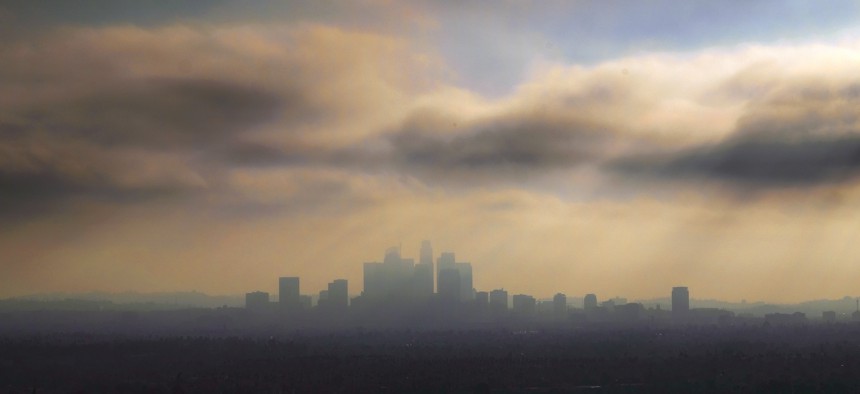EPA Threatens California with Loss of Highway Funds Over Air Quality

In this Oct. 26, 2018, file photo, downtown Los Angeles is shrouded in early morning coastal fog and smog. AP Photo/Richard Vogel

Connecting state and local government leaders
The EPA told the California Air Resources Board on Tuesday that it must resubmit air quality plans or risk sanctions that could include the withholding of federal highway funding.
The Trump administration came out swinging against California on Tuesday in the latest round of an escalating political battle—threatening to withhold federal highway funding unless the state proves it is taking steps to improve air quality.
The Environmental Protection Agency (EPA) said California had “failed to carry out its most basic tasks under the Clean Air Act” and threatened possible sanctions, including cuts in federal highway funding, unless the state resubmits plans outlining strategies to deal with air pollution.
The move was largely seen as political retaliation against the Democrat-led state by local leaders and environmental experts, who said the EPA rarely invokes such sanctions and, in the past, has worked with states to improve their state implementation plans (SIPs).
California has more than 130 state implementation plans, which are plans drafted by local officials to guide the region’s approach to improving air quality when it does not meet federal standards.
EPA Director Andrew Wheeler informed the California Air Resources Board (CARB) in a letter Tuesday that many of those plans have been pending with the EPA for so long that they are now out of date. The Sacramento Bee first reported on Wheeler’s letter, in which he said California has the worst air quality in the country.
“EPA is notorious for sitting on these SIPs for years. Why this is suddenly California’s problem and not EPA’s problem, I don’t know,” said David Pettit, a senior attorney at the Natural Resources Defense Council.
Wheeler suggested that CARB withdraw the plans and work on crafting new standards. If the state does not withdraw the plans, he said the EPA would “begin the disapproval process.” He gave the state an Oct. 10 deadline to inform EPA about how it will proceed.
The withholding of federal highway funding would result in a loss of billions of dollars for transportation projects for California.
CARB Executive Officer Richard Corey said the EPA’s letter contained misstatements and that the backlog of outdated plans was the EPA’s own making.
“EPA has unclean hands: It sat on these documents for years and is now pounding the table about paperwork issues of its own creation,” he said.
California Gov. Gavin Newsom criticized the letter as a political stunt.
"The White House has no interest in helping California comply with the Clean Air Act to improve the health and well-being of Californians. This letter is a threat of pure retaliation,” he said in a statement.
U.S. House Rep. Mike Levin, a California Democrat, called the threat to withhold federal highway funding “outrageous.”
“Democrats and Republicans have worked together to improve our air quality, and this is just another partisan, vindictive attack on our state,” he wrote on Twitter.
The move by the EPA comes after tensions between the Trump administration and California over another environmental issue reached a head this month.
The EPA last week announced plans to revoke a waiver that has allowed the state to set its own vehicle emissions standards for more than 50 years. California’s standards, which have been adopted by 13 other states, are more stringent in curbing air pollution from cars and trucks than those set by the federal government. California’s autonomy on the issue has been a point of contention for the Trump administration as it has sought to relax Obama-era goals to raise fuel efficiency standards.
The Trump administration has also recently sparred with California over the state’s ability to address homelessness.
“This letter appeared only days after EPA attacked our state authority on cars, increasing air pollution while at the same time limiting our ability to reduce it,” said Corey with CARB. “If the Trump administration is serious about air pollution it will reconsider revoking our waiver, and while they’re at it, why not also fund the EPA to review submitted documents in less than a decade.”
The EPA would not be able to pursue sanctions against California under the Clean Air Act until 18 months after the denial of a state implementation plan, Pettit said.
The EPA could also write its own state implementation plans, which local air districts would then be required to follow.
Andrea Noble is a staff correspondent with Route Fifty.

NEXT STORY: Housing Organizations Slam White House Report on Homelessness




